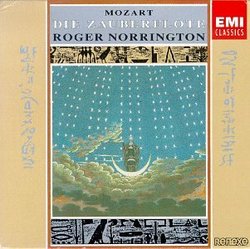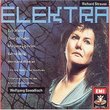| All Artists: Mozart, Argenta, Upshaw, Norrington, Lcp Title: Magic Flute Members Wishing: 0 Total Copies: 0 Label: Angel Records Release Date: 11/8/1991 Genre: Classical Styles: Opera & Classical Vocal, Historical Periods, Classical (c.1770-1830) Number of Discs: 2 SwapaCD Credits: 2 UPC: 077775428728 |
Search - Mozart, Argenta, Upshaw :: Magic Flute
 | Mozart, Argenta, Upshaw Magic Flute Genre: Classical
|
Larger Image |
CD DetailsSimilar CDs |
CD ReviewsProvocative, challenging - and not always convincing Discophage | France | 09/16/2007 (3 out of 5 stars) "When it comes to Classical and early-Romantic repertoire, Roger Norrington, with his London Classical Players, was in those years ever provocative, challenging and illuminating. He made a rule of NOT taking in account the established and most time-honored interpretive traditions (or only to challenge them), but of looking at score only, nourished by a certain notion of what performance practice was back then. His main trademarks were brisk tempos, especially challenging in the slow movements, and a new look at orchestral balance, giving due place to woodwinds and brass. I immensely enjoyed Norrington's Beethoven Symphonies (Beethoven - Symphonies 1-9 · Overtures / London Classical Players · Sir Roger Norrington), and appreciated his Don Giovanni (Mozart: Don Giovanni). I found them to be an ear-cleansing process: if you are ready to discard your listening habits and expectations and just listen, with an unbiased eye on the scores, to what Norrington has to offer, his ways seem not only justified by the printed note but also musically valid and rewarding. It's like looking at the Michelangelo ceilings after they've been restored: suddenly you see the gaudy colors that had been concealed under layers and layers of patina - which painting conservators just call "dirt". But there are many who are incensed at these gaudy colors. Old habits have an abiding power of their own. So I was braced for this 1990 Magic Flute. Well, challenging, provocative, it certainly is. But successful? Not entirely, I think. From the three opening bars on, you know you are in for something unheard: every conductor in history gave the two 32-note chords the value of a quarter- or semi-note. Solemnity, I s'pose. Yes, but Mozart wrote 32-notes. With Norrington, they snap like gunshots. There's also a startling orchestral surge announcing the first arrival of the Queen of the Night, and menacing brass chords to frighten off Papageno in Act II - both required by score, but never played. The tempos are brisk indeed, and as early as the overture's opening adagio, closer to what today would be an allegro non troppo. The approach certainly lends great urgency and drive to the music, and a welcome sense of emotional agitation in passages which usually sound only placid, like Tamino's love aria or his solo recitative in the first act Finale, or Papageno's search for Papagena in the Act II Finale. The approach is especially challenging in those numbers we are used to hearing more laid-back or restrained. "Andante" means "moving", and Papageno's arias certainly move, jauntily and merrily - you'd almost think of a boy in shorts skipping along. A little less plodding solemnity than usual in Sarastro's two arias isn't unwelcome, and one can also accept that the Three Kids at the beginning of both Finales should be playful rather than solemn. Norrington also has a keen ear for color, and there are felicitous moments such as Papageno's Panpipes and bells and the dialogue between Tamino and Papageno's flutes. Still, Norrington's systematic application of these swift tempos doesn't allow for much dreaminess, interiority or solemnity in the passages that do benefit from them, such as Pamina's aria, the Pamina-Papageno duet, the Three Ladies various farewells, Sarastro's first chorus-announced entrance (here very sprightly), the Armored Men scene, etc. The cast isn't entirely successful either. Anthony Rolfe-Johnson is a superb Tamino - not the Wunderlich-Heldentenor kind, but a more modern-type of Mozart tenor, with a lighter voice, though with both the firmness and the softness of the best Taminos of today, and nothing nasal in his timbre. Andreas Schmidt is also a fine Papageno, with a timbre reminiscent of Fischer-Dieskau, but with none of the latter's fussiness. The only thing he is lacking is the irresistible Viennese accent of my favorite Papagenos. Olaf Bär is a noble Sprecher, finely contrasted with Tamino's immature raging. Guy de Mey has some vibrato when he pushes the voice, but otherwise makes a fine and nasty Monostatos. Cornelius Hauptmann is a soft-grained Sarastro, conveying the character's goodness but not his more disquieting, sectarian and misogynist traits. The Drei Knaben are sung by women, and they do it with fine vibrato-less voices than can easily pass off for boys, and with more pitch-precision than the customary Viennese adolescent. But where Norrington is mostly wanting I find is in the ladies department. His preference for light, flute-like sopranos results in characters that sound girlish and dehumanized. It is OK if the Three Ladies' timbral balance is skewed in the direction of soprano - there is nothing against them sounding like three brats. But while Beverly Hoch sings all the the Queen of the Night's notes alright and with an appropriately raging and fiery characterization, her voice simply lacks the body to fully convey all these emotions: she sounds like a mechanical Olympia. Dawn Upshaw has superb purity of timbre, but rather disembodied I find: the fairy-tale princess from Ravel's L'Enfant et les Sortilèges rather than a young woman of flesh and blood. An ideal Pamina should be both. I don't know if the recording originated in actual stage performances, but it is full of genuine theatrical life, sound effects and all. The spoken dialogue is given fairly complete, with lots of rarely heard passages, and delivered by the singers with fine theatrical life (the Three Ladies are particularly effective, in their constant challenging and interrupting each other) and traces of English accents. Only Rolfe-Johnson do I find a little too artificially declamatory, while Schmidt misses the humor of the "Ich bleibe ledig" scene, and the Papagena, ditching the old tradition of playing old hag, is not very funny either. Hey Bob, tradition isn't always wrong, man! Ultimately both the interest and the limitation of this recording is that it is many ways "experimental", with all the risks and errors implied. The results are always interesting, but not always convincing. Also, the overall impression is of fairy-tale cardboard figures, not creatures of flesh and blood. The Salzburg puppeteers could usefully substitute this recording for their time-worn 1955 Fricsay. " Good and fast. Philip S. Griffey | Bainbridge I. WA USA | 07/06/2008 (4 out of 5 stars) "Norrington's conducting, in this 1990 recording, runs the gamut from fast to really fast. If you don't mind the fleet tempi, you will find that his direction is dramatic, well nuanced, with attractive phrasing and good balance. There is lots of very well done dialog and sound effects. The chorus, various women, armored men, boys, priests etc. are all much better than average.
Tamino has been recorded by a number of elegant singers (Wunderlich, Simoneau, Dermota, Haefliger, and Blochwitz). I find Anthony Rolfe Johnson's singing in no way inferior to theirs. He has an attractive voice, and sings with feeling, employing nuanced phrasing and pleasant legato. The Papageno, Andreas Schmidt, has a warm mid-range baritone voice; he also sings with feeling, while not exhibiting any notable flaws or deficiencies, and does a nice job of capturing his character's feckless personality. Beverly Hoch (The Queen of the Night) has a reasonably pleasant voice of moderate size and handles the coloratura well. She sounds distinctly uncomfortable in the dramatics of her second aria. Dawn Upshaw (as Pamina) sings beautifully in the ensemble pieces, however, her "Ach ich Fuhl's" doesn't work; the technique is fine - it just never engages the listener. Cornelius Hauptmann is a somewhat understated Sarastro. He does better in the slower paced "Isis und Osiris" than in the quickly paced "In diesem Heil'gen Hallen". While his singing is entirely adequate, it fails to leave much of an impression. Olaf Bar excels as the Speaker. The recorded sound is excellent.. If you find Norrington too fast, try Gardiner or Christie for other good "historically informed" Flutes. If you want a fine German Romantic rendition, look to Klemperer or Boehm (1955 or the 1964 with Wunderlich.) . If you want a "not too romantic, not too historically informed" but very fine recording, try Abbado's. " |

 Track Listings (27) - Disc #1
Track Listings (27) - Disc #1
